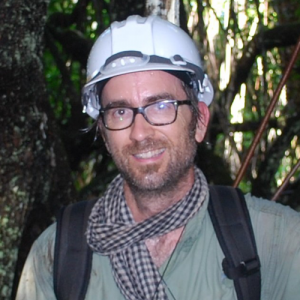Rich MacKenzie is an aquatic ecologist who works for the US Forest Service at the Institute of Pacific Islands Forestry in Hilo, Hawaii as well as with the International Programs office in Washington DC. He received his PhD from the University of Wisconsin at Milwaukee in 2000, where he studied the interactions of aquatic invertebrate communities, sediments, and carbon in coastal wetlands around Lake Michigan. He then worked as a postdoctoral fellow at the Wells National Estuarine Research Reserve with Dr. Michele Dionne. There, he studied the interactions of fish communities, sediments, and carbon in salt marsh ecosystems in the Gulf of Maine. In 2003, he started to work with the USFS in Hilo, HI, where he has continued to study fish and invertebrate communities, sediments, and carbon in Pacific Island mangroves and streams. Working with USFS International Programs, he helps oversee the Sustainable Wetland and Adaptation Mitigation Program (SWAMP), a USAID funded program that conducts research in the Asia-Pacific, Latin America, and Africa to better understand the role mangroves play in climate change mitigation and adaptation as well as developing methods to more effectively restore them. More recently, he has been helping implement the Pacific Island Forest Restoration Initiative (PIFRI) that restoring mangroves and terrestrial forests across the western Pacific. When he is not covered in mud, collecting sediment cores or sesarmid crabs, he enjoys making music, watercolor painting, trying to surf, and camping/canoeing/hiking.

CIFOR-ICRAF aborda retos y oportunidades locales y, al mismo tiempo, ofrece soluciones a los problemas globales relacionados con los bosques, los paisajes, las personas y el planeta.
Aportamos evidencia empírica y soluciones prácticas para transformar el uso de la tierra y la producción de alimentos: conservando y restaurando ecosistemas, respondiendo a las crisis globales del clima, la malnutrición, la pérdida de biodiversidad y la desertificación. En resumen, mejorando la vida de las personas.
GOBERNANZA

Explore eventos futuros e passados em todo o mundo e online, sejam hospedados pelo CIFOR-ICRAF ou com a participação de nossos pesquisadores.
EVENTOS PRÓXIMOS

ÚLTIMAS NOTÍCIAS
A ciência precisa de canais de comunicação claros para cortar o ruído, para que a pesquisa tenha algum impacto. O CIFOR-ICRAF é tão apaixonado por compartilhar nosso conhecimento quanto por gerá-lo.

Découvrez les évènements passés et à venir dans le monde entier et en ligne, qu’ils soient organisés par le CIFOR-ICRAF ou auxquels participent nos chercheurs.
EVENTOS PRÓXIMOS

Jelajahi acara-acara mendatang dan yang telah lalu di lintas global dan daring, baik itu diselenggarakan oleh CIFOR-ICRAF atau dihadiri para peneliti kami.
EVENTOS PRÓXIMOS

Actualités
Pour que la recherche ait un impact, la science a besoin de canaux de communication clairs pour aller droit au but. CIFOR-ICRAF est aussi passionné par le partage de ses connaissances que par leur production.

ÚLTIMAS NOTICIAS
Para que la investigación pueda generar algún impacto, los conocimientos científicos requieren de canales de comunicación claros. En CIFOR-ICRAF, compartir nuestros conocimientos nos apasiona tanto como generarlos.

Explore eventos futuros y pasados organizados por CIFOR-ICRAF o con la participación de nuestros investigadores.
EVENTOS PRÓXIMOS

CIFOR-ICRAF produce cada año más de 750 publicaciones sobre agroforestería, bosques y cambio climático, restauración de paisajes, derechos, políticas forestales y mucho más, y en varios idiomas. .
EXPLORE NUESTROS RECURSOS
Consulte las productos de investigación de CIFOR-ICRAF, disponibles en una amplia variedad de formatos y en línea.
Kabar terbaru
Ilmu pengetahuan membutuhkan saluran komunikasi yang jelas untuk mencapai tujuan, jika ingin dampaknya terlihat. CIFOR-ICRAF sangat bersemangat untuk berbagi pengetahuan sembari menghasilkan pengetahuan itu sendiri.

CIFOR-ICRAF genera impacto mediante conocimiento científico de vanguardia. Desarrollamos investigaciones innovadoras, fortalecemos las capacidades de nuestros socios y dialogamos activamente con todas las partes interesadas, aportando el conocimiento más reciente sobre los bosques, árboles, paisajes y personas para la toma de decisiones a escala mundial.

CIFOR-ICRAF aborda retos y oportunidades locales y, al mismo tiempo, ofrece soluciones a los problemas globales relacionados con los bosques, los paisajes, las personas y el planeta.
Aportamos evidencia empírica y soluciones prácticas para transformar el uso de la tierra y la producción de alimentos: conservando y restaurando ecosistemas, respondiendo a las crisis globales del clima, la malnutrición, la pérdida de biodiversidad y la desertificación. En resumen, mejorando la vida de las personas.
GOBERNANZA

CIFOR–ICRAF achieves science-driven impact. We conduct innovative research, strengthen partners’ capacity and actively engage in dialogue with all stakeholders, bringing the latest insights on forests, trees, landscapes and people to global decision making.

CIFOR–ICRAF publishes over 750 publications every year on agroforestry, forests and climate change, landscape restoration, rights, forest policy and much more – in multiple languages.
Explore our knowledge
Browse CIFOR–ICRAF’s published research in a wide range of formats, all of which are available for free online.

CIFOR–ICRAF addresses local challenges and opportunities while providing solutions to global problems for forests, landscapes, people and the planet.
We deliver actionable evidence and solutions to transform how land is used and how food is produced: conserving and restoring ecosystems, responding to the global climate, malnutrition, biodiversity and desertification crises. In short, improving people’s lives.
Governance
Para consultas de carácter general
El Centro para la Investigación Forestal Internacional y el Centro Internacional de Investigación Agroforestal (CIFOR-ICRAF) fomenta el poder de los árboles, los bosques y los paisajes agroforestales para hacer frente a los desafíos globales más apremiantes de nuestro tiempo: la pérdida de biodiversidad, el cambio climático, la seguridad alimentaria, los medios de vida y la inequidad.CIFOR e ICRAF son Centros de Investigación CGIAR.
Para consultas de carácter general:
Para consultas de medios de comunicación, póngase en contacto con:
Suscríbase al boletín de noticias de CIFOR-ICRAF
© 2025 Centro para la Investigación Forestal Internacional (CIFOR) y Centro Internacional de Investigación Agroforestal (ICRAF) | CIFOR e ICRAF son Centros de Investigación del CGIAR | Aviso de privacidad de CIFOR-ICRAF









